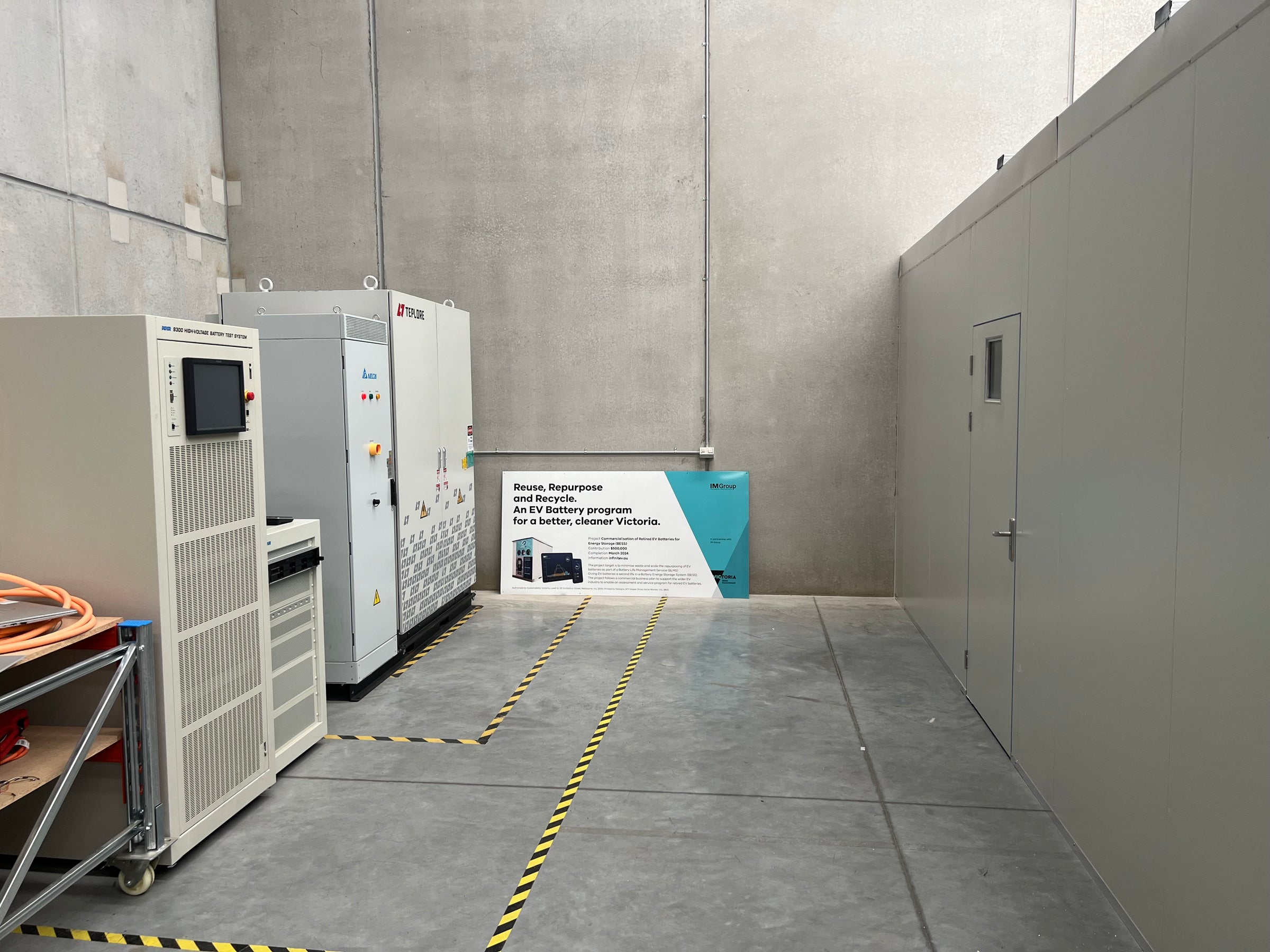Controlled Storage and Maintenance of Electric Vehicle Batteries
Protect Your EV Batteries: Why Controlled Storage is Essential for Safety and Longevity
Looking for safe and reliable storage solutions for high-voltage EV batteries? Infinitev offers expertly managed controlled storage services for electric vehicle batteries. Our secure facilities are engineered to provide the optimal environment for EV battery storage, ensuring safety, longevity, and peak performance. Whether you're storing EV batteries for fleet management, dealerships, or spare parts, our facility meets all industry standards for safe storage and monitoring.
Storing high-voltage EV batteries safely requires following specific guidelines to ensure they remain in good condition and pose minimal safety risk. Our engineers work with carmakers and battery manufacturers to establish the best protocols for each battery system. While every battery has its own unique requirements, these are the general guidelines that we built into our dedicated facilities so that we can accommodate the needs of all battery systems:
Temperature Control
It's best to avoid exposing EV batteries to extreme temperatures, both high and low, as these can degrade performance and safety. Whilst in-vehicle, the car's thermal management system will warm up the battery if ambient temperatures are very low, or cool it when it gets too hot. These systems cannot maintain the battery once it's removed from the vehicle, so we need to use external systems to control temperature. Our storage environment has been designed to maintain a stable temperature of between 15–25°C (59–77°F).
Humidity Control
High-humidity environments can lead to moisture accumulation and corrosion - not a good match for high voltage EV batteries. Our dedicated storage environment is actively controlled for relative humidity to mitigate this risk. Your battery assets will be protected in a designated, well-ventilated area away from flammable materials. The space is kept dry with minimal dust or contaminant ingress. Batteries are stored in OEM-grade containers and crates in dedicated slots, and never stacked to avoid crushing or pressure. All assets are regularly inspected for safe storage conditions.
Active Maintenance
EV batteries need periodic recharging during storage to maintain an optimal State of Charge (SoC), typically around 30-50%, which prevents deep discharge or overcharging. Over time, even unused batteries experience a natural decrease in charge due to self-discharge, which, if left unchecked, can lead to a state of deep discharge that degrades the battery’s capacity and can potentially damage the cells permanently. Periodic recharging also helps ensure the battery remains ready for use when needed, extending its life and preserving its overall performance.

CONTROLLED
EV BATTERY MAINTENANCE
Our dedicated facility protects your asset through state of the art facilities that ensure temperature control, relatively humidity control, and are equipped with cutting-edge battery testers and a dedicated microgrid that allow our team of expert engineers to maintain your batteries in optimal condition.
- Temperature-Controlled Facilities: Our storage facilities maintain consistent temperatures, reducing the risk of thermal runaway and extending the lifespan of your EV batteries.
- Humidity and Contamination Control: We ensure low-humidity, clean environments that prevent corrosion and moisture damage, essential for battery health.
- Regular Monitoring and Inspection: Our specialist team conducts routine inspections to check for potential hazards such as leaks, swelling, and charge levels.
Secure Your Batteries Today!
Protect your investment and store your EV batteries with confidence. Infinitev’s controlled storage service is your solution for safe, reliable, and fully managed EV battery storage. Ready to learn more? Contact us today for a free quote and discover how we can support your storage needs with our premium EV battery storage solutions.

Increased Battery Lifespan
Controlled environments help reduce natural degradation, keeping batteries in peak condition until they're needed.

Reduced Safety Risks
With proactive monitoring and professional-grade storage protocols, you minimise the risks associated with battery storage.

Compliance and Peace of Mind
Our facility adherse to strict safety guidelines and environmental regulations, so your batteries are stored in compliance with industry best practices.
Contact us
The most commonly asked questions about EV batteries
We field lots of questions about EV batteries and the services we provide to repair, reuse, repurpose and recycle them. Sharing is caring, so here goes - a list of the most frequently asked questions.
Can EV batteries be recycled?
Yes, EV batteries can be recycled. Recycling helps recover valuable materials such as lithium, cobalt, and nickel, reducing the environmental impact of battery disposal. However, there is a better way to minimise the environmental impact of EV batteries. The highest value of the battery is by using it in an electric vehicle as a traction battery (that is, to extend the battery's life in its original application). If reuse as traction battery is not possible, then it may be feasible to repurpose the battery to a different application like energy storage systems. These so-called second life batteries spread the manufacturing footprint over many years and defer the need to extract more raw materials from the earth to make new batteries for this second-life market. Our SafetyCheck and HealthCheck services allow us to determine the next-best use of EV batteries once they are taken from the vehicle.
How long do EV batteries last?
Hopefully the battery will last the life of the vehicle. But like any automotive parts, high-voltage electric vehicle batteries can deteriorate over time. The lifespan of EV batteries varies depending on factors such as usage patterns, temperature conditions, and the specific battery chemistry. Generally, most EV manufacturers warranty their batteries for around 8 to 10 years and/or a certain number of miles/kilometers, typically ranging from 160,000 to 200,000 kilometers. Some manufacturers also offer a State Of Health (SOH) guarantee, typically around 70%. SOH measures a battery's maximum charge compared to its rated capacity. For example, a battery with a maximum charge of 56kWh on a rated capacity of 70kWh is 80% (56/70 * 100%). Infinitev's Fast HealthCheck is a fast (3-minute) diagnostic of your EV's battery health (measuring SOH and other relevant health parameters) without the need to remove the battery from the vehicle.
How do I extend the lifespan of my EV battery?
To extend the lifespan of your EV battery, it's important to avoid frequent deep discharges, minimise exposure to extreme temperatures, and use appropriate charging methods. Additionally, keeping the battery within the optimal state of charge (around 20% to 80%) and avoiding frequent fast charging can help prolong its life. If you're unsure about the current condition of your battery, visit your dealer for a scan or talk to us about our Fast HealthCheck - a detailed diagnostic service and battery appraisal in under 10 minutes.
What is the cost of replacing an EV battery?
The cost of replacing an EV battery varies depending on factors such as the vehicle model, battery size, and manufacturer policies. Most electric vehicles in New Zealand and Australia are still under warranty, so check the warranty conditions and contact your dealer if you think the battery might be in need of replacement. If your vehicle is out of warranty, then your local dealer will likely charge you tens of thousands of dollars. The high cost reflects the specialist skill required to do the work, the cost of importing a new battery, and the labour to do the job well. At Infinitev, we are developing a range of replacement batteries for popular vehicles like Mitsubishi Outlander PHEV SUV, Nissan Leaf, and relative newcomers like BYD Atto3 so that EV owners can keep their cars for longer without breaking the bank.
Can I upgrade my EV battery?
We get this question quite a lot, especially from people who own (and love!) early-generation electric vehicles like the first Nissan Leaf. While aftermarket options for EV battery upgrades exist, they may be limited and vary depending on the vehicle make and model. Aftermarket upgrades should be approached with caution, as they may void warranties or compromise vehicle safety and performance. It's important to understand that the entire vehicle is part of the high-voltage system and changing one component, the battery, without updating the other components in the interconnected system may lead to unintended issues. At Infinitev, we prefer to swap like with like - our remanufactured EV batteries are technically identical to the original battery and designed for optimum system performance.
What are the different types of EV batteries available?
And our fave follow-up question - can I change mine from X to Y? Let's answer the main question first. There are several types of EV batteries available, with the most common being some variety of lithium-ion chemistry. Within li-ion, variations include Nickel-Metal Hydride (NiMH) - typically used in older hybrids, Lithium Iron Phosphate (LiFePo4), Lithium Nickel Manganese Cobalt (NMC), and Lithium Cobalt Aluminum Oxide (NCA). Each type has its own characteristics in terms of energy density, cost, and performance. And in the very fast-moving world of battery tech, we see many new chemistries and form factors being explored. At Infinitev, it's our job to keep up with the latest in battery tech, and to be ready with our engineering services to reuse, repurpose and recycle all EV batteries. To answer the change-chemistry question - technically this is possible, but you will likely struggle to find a readily available solution from a reputable battery manufacturer that comes with a decent warranty and proven safety record. Safety has to be your #1 consideration here.
How does fast charging impact EV battery health?
Fast charging, while convenient, can impact EV battery health over time due to increased heat generation and stress on the battery cells. Frequent use of fast chargers may accelerate battery degradation, leading to reduced capacity and lifespan. We'd recommend to use fast charging sparingly and prioritise slower charging methods for daily use.
What is the expected degradation of EV batteries over time?
There is no hard and fast rule here. The degradation rate of EV batteries varies depending on factors such as battery chemistry, usage patterns, and environmental conditions. On average, EV batteries may lose around 2-3% of their capacity per year, although newer battery technologies and improved thermal management systems are reducing degradation rates in modern EVs.
How does regenerative braking affect EV battery life?
Regenerative braking, which captures and stores energy during braking or coasting, can help extend EV battery life by reducing wear on the brake pads and minimising energy loss. However, frequent use of regenerative braking at high speeds or on steep descents may increase the thermal load on the battery, potentially impacting its longevity. What's that phrase again? Too much of a good thing...
Can extreme temperatures affect EV battery performance?
Yes, extreme temperatures, both hot and cold, can affect EV battery performance and lifespan. High temperatures can accelerate battery degradation, while cold temperatures can reduce range and efficiency. It's essential to park your EV in shaded areas during hot weather and pre-condition the battery in cold weather to mitigate these effects.
Did we miss a question? Get in touch!






